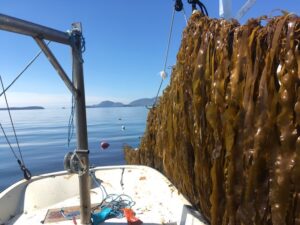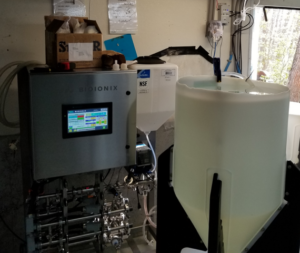This story is the second in a series about the impact of high-speed internet connectivity on Maine’s coast. To learn more about Island Institute’s investments in broadband infrastructure on the coast, visit our Broadband & Digital Equity webpage or reach out to cthorpe@islandinstitute.org
Located at the top of the Schoodic Peninsula, in the pristine waters of Frenchman Bay, Springtide Seaweed sustainably farms seaweed using minimal equipment and labor thanks in part to their internet connectivity and employment of state-of-the-art technology.
Springtide Seaweed owns the largest aquaculture farm in the lower 48 and provides online Zoom consultations to commercial and recreational farmers far beyond Maine. Although seaweed farming is traditionally thought of as a labor-intensive industry that utilizes rudimentary and simple practices, the intersection of technology and sea farming could not be more pronounced.
“A lot of people have the perception that being a seaweed farmer is easy, when, in fact, it takes a lot of money, training, and experience.” - Andrea (Trey) A. Angera, Jr., Chief Operation Officer
Trey explained that he would rather hire someone with tech experience and basic Google Suite skills, over someone who has experience in sea farming. This skill preference is largely due to how big of a role ‘The Internet of Things’ plays in their daily operations.
More automation and connectivity allows for leaner staffing and more efficient operations. Broadband-powered technology is used throughout their facilities to accomplish everything from controlling lights to data security. Monitoring equipment measures and reports pH levels, pollution, and temperatures of all the tanks so the staff are able to make data driven decisions. In addition, they use Alexa–Amazon’s voice command system–to place orders, send messages, or add appointments to their calendars. The company is willing to invest into enhancing the digital literacy skills of its employees, but requires that employees come knowing at least the basics. Springtide Seaweed has been working hard to close the digital equity gap of their employees by giving employees phones, monthly plan subscriptions, and hotspots so that they stay connected to the internet throughout the facility despite limited cell service in the area.
Beyond its operational uses, internet connectivity is also critical to the company’s data systems. Over the years Springtide Seaweed has developed many unique kelp growing technology practices. This proprietary information is housed on the company’s own servers that live in-house, ensuring privacy and security. The day to day operational items are traceable and instantly uploaded onto cloud storage. These productivity tools and efficiency-driven technology allow Springtide Seaweed to not only produce the highest yields but also make the biggest return on their investment. Utilizing these features and tools uses around 100 Gigabytes of data every day which requires fast and reliable internet. This comes with a lot of challenges in Downeast Maine.
DSL was the only available option in the area for a while, and was not sufficient to meet the needs of a larger facility that relies on so many internet-based apps. As a result, Springtide Seaweed decided to purchase a Starlink – a low-altitude satellite by SpaceX that provides a much more reliable connection.
“We rely on the internet everyday for our business, and because of the poor quality of service in Gouldsboro, we’ve had to switch to satellite internet. We require the internet for our business. When we had poor connection with our former service, we would switch to our cell phone services. Satellite has provided better connectivity, but is more expensive.” – Sarah Redmond, Founder
Although reliable for the most part, satellite signals can be affected by weather, cloud coverage and experience intermittent outages as they orbit the Earth. This could look like being kicked out of a Zoom meeting in the middle of a call without automatic reconnection or your auto-save and cloud upload not working due to lack of connection. To ensure smooth workflow and prevent the loss of data, Springtide Seaweed decided to invest in hotspots that kick in when they lose the satellite connection for a couple of milliseconds. With so many redundancies and backups, their monthly internet subscription ends up being very expensive, even more so than their monthly electric bills. For smaller businesses, this presents a financial burden and a real drawback.
With broadband infrastructure expansion in full swing in other parts of the state, folks on the Schoodic peninsula have felt left behind. Residents from Winter Harbor and Gouldsboro formed the Schoodic Peninsula Broadband Committee in 2022 with some initial planning support from Island Institute followed by enrollment in the Maine Connectivity Authority “Get Ready” program. With this planning work complete, the peninsula is in a good position to receive the next wave of infrastructure funding through the NTIA Broadband Equity, Access, and Deployment (BEAD) program. With the improved internet connection, Springtide Seaweed hopes to expand its personalized Zoom consultations, grow their business, make it more resilient, provide more educational opportunities, and create more of a community around aquaculture tourism.




